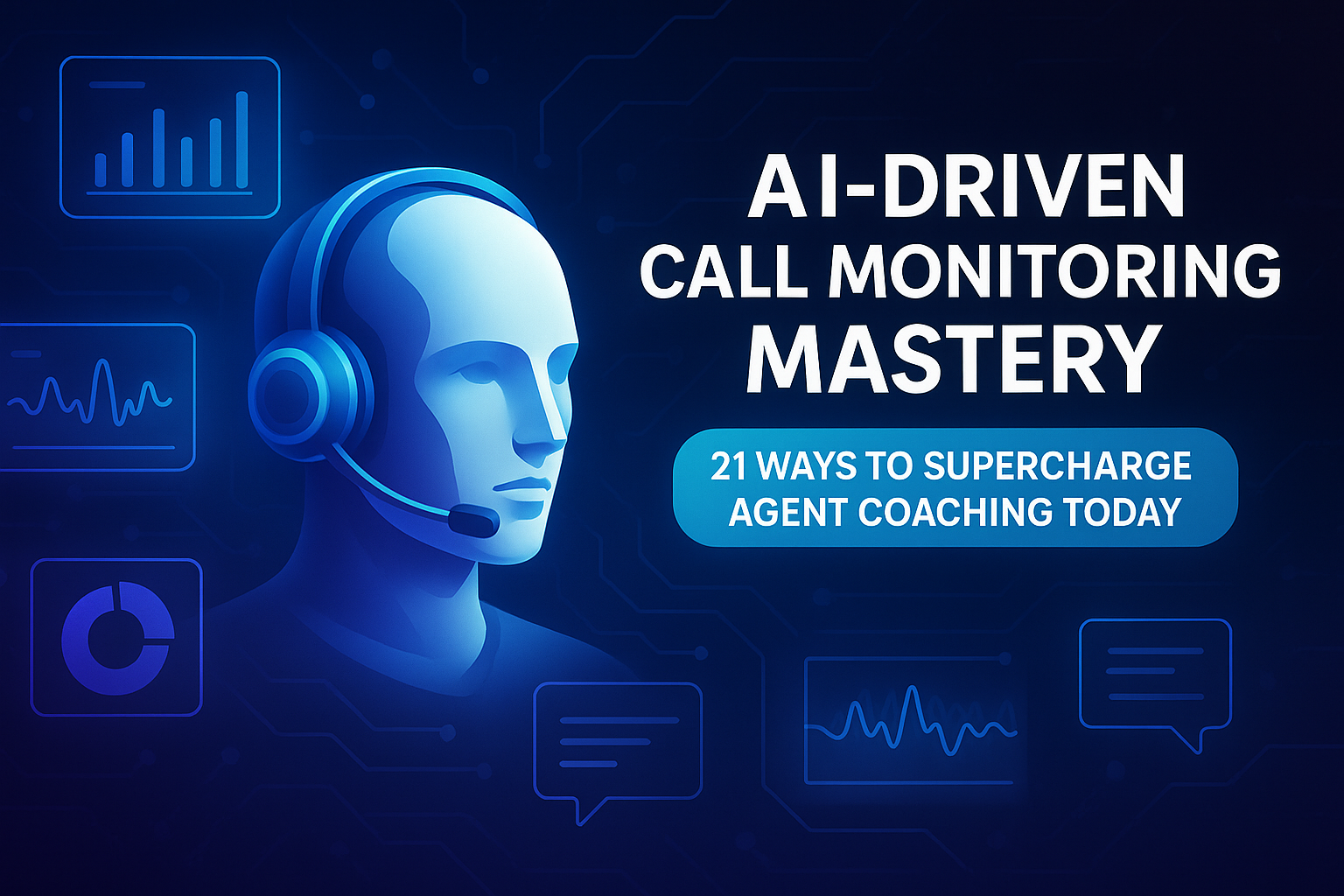
Introduction: Why AI-Powered Call Monitoring is Game-Changing
AI isn’t just a futuristic concept anymore—it’s actively redefining how contact centers operate. Call quality monitoring, once a manual and time-consuming task, has transformed into a real-time, scalable, and actionable function through artificial intelligence. As businesses strive to improve agent performance, customer satisfaction (CSAT), and compliance, AI becomes not just helpful—but essential.
The Evolution of Call Monitoring in Contact Centers
Before AI, supervisors randomly picked 1–2% of calls to review. That left 98% of conversations unchecked. Now, with AI, 100% of interactions can be analyzed—instantly.
| Factor | Traditional Monitoring | AI-Powered Monitoring |
|---|---|---|
| Scope | Manual sampling | Full-call coverage |
| Speed | Delayed review (weekly/monthly) | Real-time alerts |
| Accuracy | Subjective scoring | Objective data-driven |
| Insights | Limited context | Deep behavioral analytics |
AI levels the playing field. Every agent gets equal visibility, and no crucial coaching moments go unnoticed.
Core Benefits of AI in Call Quality Monitoring
Agents don’t have to wait days for feedback. With AI, feedback arrives seconds after the call ends—or during the call for real-time nudges.
AI removes evaluator bias. Whether it’s Sarah in Support or Raj in Sales, evaluations are consistent and data-backed.
Instead of manually scoring hours of calls, supervisors now spend time on coaching and mentoring—where human expertise truly shines.
How AI Transforms Agent Coaching Practices
AI reveals trends: Which agents excel at empathy? Who struggles with call control? No more guesswork.
Forget cookie-cutter training. AI suggests personalized modules based on agent behavior, performance, and call history.
Sales, support, retention—every role has different KPIs. AI tailors improvement areas accordingly.
The 21 Power Features of AI-Based Monitoring Tools
Measures customer and agent sentiment throughout the call using tone and language.
Flags awkward or excessive silences, signaling confusion or disengagement.
Converts calls to searchable text in real time, enhancing review accuracy.
Detects phrases linked to product issues, pricing, cancellations, etc.
5. Real-Time Alerts
Alerts managers when sensitive issues or escalations arise.
6. Agent Emotion Detection
Identifies stress or disengagement in agent voice tone.
Checks if the agent followed required compliance or upselling scripts.
Creates dynamic, multi-metric performance scores for each interaction.
Analyzes speech patterns, talk speed, interruptions, and more.
Automatically tags calls likely to escalate based on tone and keywords.
Detects aggression, calmness, friendliness in tone to coach better responses.
Visual representation of high-stress points or crucial conversation turns.
Auto-generates a coaching task when certain thresholds are crossed.
Identifies product issues or FAQ trends before they become widespread.
Ranks agents across metrics to identify top and bottom performers.
Suggests micro-learning modules based on call data patterns.
Forecasts agent burnout or churn risks using past behavior.
AI-generated scorecards evolve based on industry updates and KPIs.
Traces back recurring complaints to a flawed process or script.
Supports global operations with accurate, multi-language monitoring.
Creates TL;DR summaries for faster review by supervisors.
Real-World Success Stories with AI Monitoring
A FinTech company reduced escalations by 35% and improved first-call resolution by 22% using AI monitoring and coaching.
A healthtech support team reduced average handle time (AHT) by 18% while improving patient satisfaction by leveraging real-time feedback loops.
AI Ethics and Transparency in Monitoring
Transparent communication is vital. Agents must understand that AI is a tool for support, not surveillance.
Ensure diverse training data and continuous tuning to avoid cultural or linguistic bias.
Implementation Roadmap for AI Monitoring
Whether it’s reducing churn or improving call handling—start with clear targets.
Look for tools with proven scalability, integrations, and compliance certifications.
📌 External Resource:
Gartner Magic Quadrant for CCaaS Platforms
Empower your team with workshops, pilot phases, and clear documentation.
FAQs About AI in Call Quality Monitoring
No. AI augments human review but doesn’t replace contextual human judgment.
Yes, leading platforms offer encryption and compliance with GDPR, HIPAA, etc.
Many platforms offer out-of-the-box integration with minimal setup, going live in weeks.
When positioned as a coaching tool, most agents welcome real-time feedback and development.
It’s often more cost-effective long-term, given the reduction in manual QA time.
Absolutely. By ensuring every agent interaction improves, CSAT and loyalty metrics rise over time.
Conclusion: The Future of AI in Agent Coaching
AI has unlocked a new era of proactive, precise, and personalized agent coaching. With tools that analyze every word, tone, and pause in real time, managers no longer have to chase quality—it becomes embedded in every interaction.
As we look to the future, the combination of AI-powered call monitoring and human-centric coaching will become the gold standard for contact centers committed to excellence.

